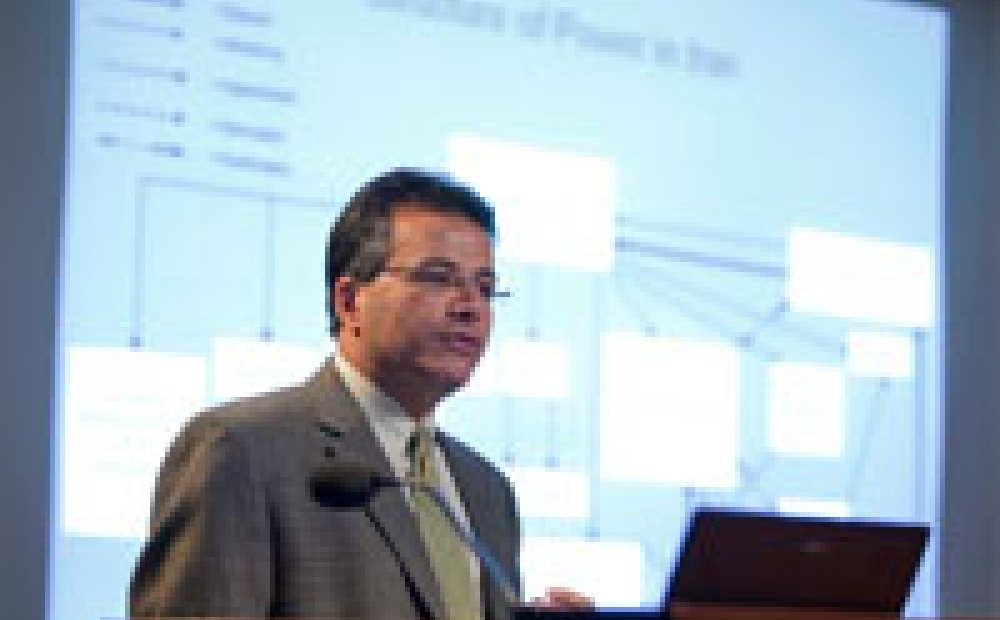Analyzing the Political Elite of the Islamic Republic of Iran

The power of Revolutionary Guard members and war veterans is increasing in Iran while the clergy is losing ground but maintaining the upper hand, according to an Iranian expert who conducted a study to analyze the current ruling structure in Iran. While still a work in progress, this study of nearly 2,000 individuals in Iran's present political elite has provided significant empirical findings rather than previous analysis of the country's internal dynamics that has been primarily anecdotal.
The Middle East Program of the Woodrow Wilson Center and the United States Institute of Peace (USIP) Muslim World Initiative hosted a discussion on March 18, 2010 with Mehrzad Boroujerdi, Associate Professor, Political Science, Maxwell School of Citizenship and Public Affairs, Syracuse University and Daniel Brumberg, Acting Director, Muslim World Initiative, Center for Conflict Analysis and Prevention, USIP who provided commentary. Haleh Esfandiari, Director of the Middle East Program at the Woodrow Wilson Center, moderated the event.
Boroujerdi began his talk by emphasizing the importance of an institutional approach to understanding Iranian politics, not to discount the value of an individual approach but to underscore the explanatory power of studying institutions. In studying each of Iran's institutions, he noted a generational change since the 1979 Iranian Revolution with substantial differences in the average age of individuals across the country's institutions. Whereas the average age for the first revolutionary cabinet members was in the 50s, for instance, the average age for cabinet members in Ahmadinejad's government is in the 20s.
Boroujerdi looked at several other factors of the political elite including the educational background. He found that 27 percent of the elite have a clerical education. He noted that the clerics are "losing the popularity game," which is evident in the radical decline from their representing 50 percent in parliament immediately after the Revolution to just ten percent presently. With the decline of clerics in parliament, they are increasingly occupying appointed offices. We are witnessing the rise of another constituency – Revolutionary Guard members and war veterans – who fill the vacuum, he said.
Boroujerdi highlighted the considerable increase in Revolutionary Guard representation and relative decline in clerical representation in Iran's institutions, noting these changes were part of normal dynamics rather than indicative of something cynical. The de-clericalization trend is due in part to the social capital of war veterans who have the necessary revolutionary credentials, networking abilities, and economic means for election. He also discussed how Iranian politics that were once heavily Tehran-based have come to include the rise of elites from the provincial periphery rather than provincial capitals.
Commenting on the power of incumbency, he indicated that holding power is more assured in appointed rather than elected officials and representative of change at the bottom of the power pyramid, not the top. Boroujerdi concluded that Iran is still a theocracy but the question of a power shift is still open for debate.
Brumberg noted the importance of recognizing the significant changes in Iran as part of the country's long-term process of transition. Furthermore, he commented how the Tehran regime has successfully reached into the countryside to mobilize its constituency. He also indicated that the rising elite has no experience in international affairs, which is worrying but still a reality we face.
Drafted by Kendra Heideman on behalf of the Middle East Program
Hosted By

Middle East Program
The Wilson Center’s Middle East Program serves as a crucial resource for the policymaking community and beyond, providing analyses and research that helps inform US foreign policymaking, stimulates public debate, and expands knowledge about issues in the wider Middle East and North Africa (MENA) region. Read more
